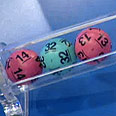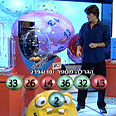

The numbers that rolled out during a live studio broadcast this past Saturday, in lottery number 2194 of Miphal HaPayis, Israel's state lottery, were 36, 33, 32, 26, 14, 13, and an additional 'strong' number 2. Moments after the celebration in the studio, curious web surfers were amazed to notice that these same numbers happened to roll out less than a month ago; on September 21, in lottery number 2187, the winning numbers were 13, 14, 26, 32, 33, 36, and a 'strong' number of 1. The order in which the numbers were picked was reversed.
"We are in the business of luck, and when it comes to chances and probabilities anything is possible, even the rare and infrequent, like in this case," said Dr. Chaim Melamed, the statistics expert for Miphal HaPayis.

Four of the six numbers, repeating themselve
Three players guessed all seven numbers correctly, including the 'strong' number, and won NIS 4 million ($1,116,694) each. This is the highest numbers of first prize winners since 2006. Ninety-two players guessed a combination of six numbers correctly, and won NIS 4,000-NIS 6,561 ($1,116-$1,831) each.
Melamed stated that people often gamble on numbers that won previously. "I assume it's like the people who hang on to birthdays," he said. "There are people that hang on to numbers that were picked in the past. This time, this wish was fulfilled. It's rare, but it's still luck."
Trillion-to-one chance
According to Zvi Gilula, a professor of statistics at the Hebrew University, getting all seven lottery numbers exactly correct, under normal circumstances, is one in 18 million. Guessing six numbers correctly, excluding the 'strong' number, is one to 2,250,000.
Gilula, an expert on gambling, estimated the probability of the same set of numbers being randomly picked twice a few weeks apart is no higher than one in 4 trillion, or 0.00000000000025.
"Usually, this is the type of numbers they use to describe the probability of life on Mars," Gilula said.
Yitzhak Melechson, a professor of statistics at the University of Tel Aviv, said that the incident of six numbers repeating themselves within a month is an event of once in 10,000 years, and addressed the issue of a mishap.
"A bend in the lottery machine is a much more complex issue. If certain numbers were repeated more often it could attest to something, but it's not the case in the repeated sextet."
Magali Skidelsky contributed to the report
- Follow Ynetnews on Facebook















